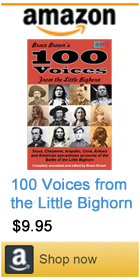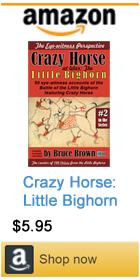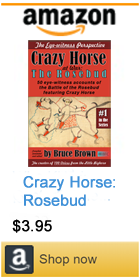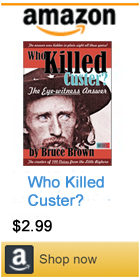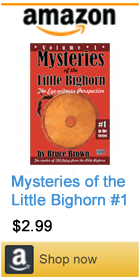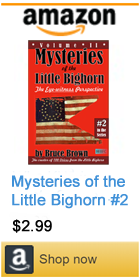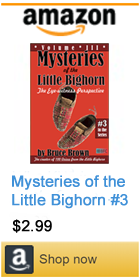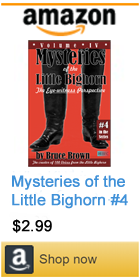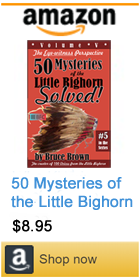|
||||||||||||
Bruce Brown's 100 Voices... Red Star's Story of the Battle
The scouts were all sitting together when they saw the two Crow scouts coming back from the highest point of the hill. These two scouts touched the Arikara scouts and they got up to sing the song they usually sing, but the two scouts signed to them to keep silent. One of these two Crow scouts then came up to Crooked Horn and told him by signs that they had seen Dakota tepees ahead. Then all the scouts climbed up the peak to look for signs of the Dakotas. The first two Crow scouts pointed in the direction of the Dakota camp. As Crooked Horn and Red Star looked, the former said: "Look sharp, my boy, you have better eyes than I." Red Star looked and saw a dark object and above it light smoke rising up from the Dakota tepees. It was at the upper end of the village, the tepees were hidden by the high ridge but the smoke was drawing out and up. Beyond the smoke he saw some black specks he thought were horses. Charley Reynolds looked a long time, then took out his field glasses and looked a long time. Then he put them down and nodded his head. He took a note book, sat down and wrote a note and got up, folded the paper, and handed it to Crooked Horn. Crooked Horn took it and turned to Red Star and said: "Boy, saddle up your pony; Bull, saddle up your pony." They had saddled up when Crooked Horn said to them: "Look, you can see the smoke of our camp." Red Star looked and saw a cloud of smoke rising up and their way back was clear, they could follow the smoke. They started down the hill, after they were down he urged his horse on for he had the note and he paid no attention to his companion. Once in a while he looked back to see where Bull was, his horse was bad. As he came up out of the hollow he saw the sentries and he gave the call, as is the custom among Arikara (the Crow scouts use the same call on bringing a message to camp), and he also began turning his horse zig-zag back and forth as a sign that he had found the enemy. When he left camp he had told Stabbed that if he came back with a message that they had found the Dakota camp, he would tie up his horse's tail, as is the custom of the Arikara. The sun was just coming up when he got to camp. The sentries began to come together in groups. Stabbed came up and said: "My Son, this is no small thing you have done." (Meaning it was a great honor, according to Arikara custom, to have brought such a message.) Red Star rode by Stabbed and got off and unsaddled. Stabbed turned and called out to the scout camp: "Why are you sleeping, Strikes-the-Bear (Red Star) has come back." Bloody Knife got up at once and met Red Star and asked him if he had seen anything. He said, yes, they had found the camp. Then he saw Gerard coming up with Custer and they came where he had unsaddled. Tom Custer was there. Custer sat down on his left knee near Red Star who was squatted down with a cup of coffee. Custer signed to Red Star asking him if he had seen the Dakotas, and he answered by a sign that he had. Then Red Star handed the note to Custer, taking it from his coat, and Custer read it at once and nodded his head. By Red Star's side was Bloody Knife and Tom Custer. Custer said to Bloody Knife by signs, referring to Tom, "Your brother, there, is frightened, his heart flutters with fear, his eyes are rolling from fright at this news of the Sioux. When we have beaten the Sioux he will then be a man." Custer then told Red Star, through the interpreter, to saddle up at once. "We are going back to where his party are on the hill," he said. Red Star was not through his breakfast, but he left his coffee, knocking it over with his foot, saddled up, and joined Custer. In the party were Custer, his bugler, Tom, Red Star, Gerard, Bloody Knife, Bob-tailed Bull, and Little Brave. They rode hard toward the hill and Red Star heard a bugle as he left camp, blown by Custer's bugler, who turned backward on his horse to do so. Custer asked by signs of Red Star if the distance was short, and Red Star made signs that it was. When they got to the foot of the hill, Red Star signed that this was the place. They climbed the hill, and came to the scouts. Charley Reynolds came up and he and Custer went ahead leaving the others behind. Charley Reynolds pointed where Custer was to look, and they looked for some time and then Gerard joined them. Gerard called back to the scouts: "Custer thinks it is no Sioux camp." Custer thought that Charley Reynolds had merely seen the white buttes of the ridge that concealed the lone tepee. Charley Reynolds then pointed again, explaining Custer's mistake, then after another look Custer nodded that he had seen the signs of a camp. Next Charley Reynolds pulled out his field glasses and Custer looked through them at the Dakota camp and nodded his head again. Crooked Horn told Gerard to ask Custer how he would have felt if he had found two dead Dakotas at the hill. The scouts had seen six Dakota Indians after Red Star and Bull had left them. Two of them had gone over the ridge down the dry coulee and four of them had ridden into the timber at the foot of the hill. They thought the two Dakotas were planning to ambush the messengers and they wished to kill them first. They did not do so because they were afraid Custer might not like it. Custer replied that it would have been all right, he would have been pleased to have found two dead Dakotas. Then the scouts sat down and one of the Crow scouts, Big Belly, got up and asked Custer through the Crow interpreter what he thought of the Dakota camp he had seen. Custer said: "This camp has not seen our army, none of their scouts have seen us." Big Belly replied: "You say we have not been seen. These Sioux we have seen at the foot of the hill, two going one way, and four the other, are good scouts, they have seen the smoke of our camp." Custer said, speaking angrily: "I say again we have not been seen. That camp has not seen us, I am going ahead to carry out what I think. I want to wait until it is dark and then we will march, we will place our army around the Sioux camp." Big Belly replied: "That plan is bad, it should not be carried out." Custer said: "I have said what I propose to do, I want to wait until it is dark and then go ahead with my plan." Red Star as he sat listening first thought that Custer's plan was good. The Crow scouts insisted that the Dakota scouts had already seen the army and would report its coming and that they would attack Custer's army. They wanted him to attack at once, that day, and capture the horses of the Dakotas and leave them unable to move rapidly. Custer replied: "Yes, it shall be done as you say." The army now came up to the foot of the hill and Custer's party rode down and joined the troop. The Arikara Narrative of Custer's Campaign against the Hostile Dakotas, June 1876, edited by Orin Grant Libby, State Historical Society of North Dakota 1920 p 86 - 93
Red Star was also called Strikes The Bear. For more information on Custer's scouts, please see The Twisted Saga of the Unsung Seventh Cavalry Scouts.
|
||||||||||||



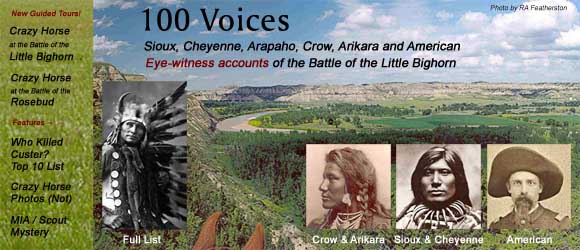
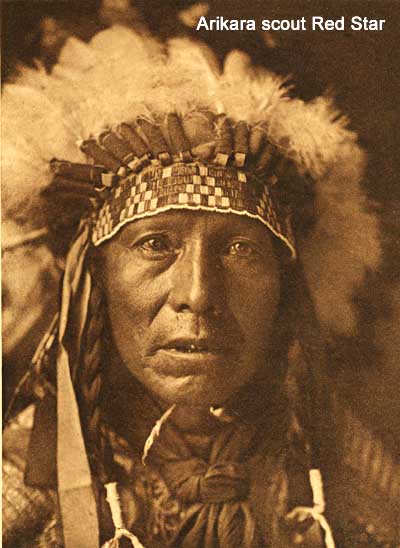 "WE WERE eating supper at the temporary camp on the Rosebud when, a little after dusk, Crooked Horn was called to Custer's quarters. On coming back he said to us: "Come, Black Fox, Red Foolish Bear, Strikes-the-Lodge, Red Star (Strikes-the-Bear), and Bull." These scouts reported at Custer's headquarters and there they saw four ponies of the Crow scouts standing saddled. At his tent stood
"WE WERE eating supper at the temporary camp on the Rosebud when, a little after dusk, Crooked Horn was called to Custer's quarters. On coming back he said to us: "Come, Black Fox, Red Foolish Bear, Strikes-the-Lodge, Red Star (Strikes-the-Bear), and Bull." These scouts reported at Custer's headquarters and there they saw four ponies of the Crow scouts standing saddled. At his tent stood 